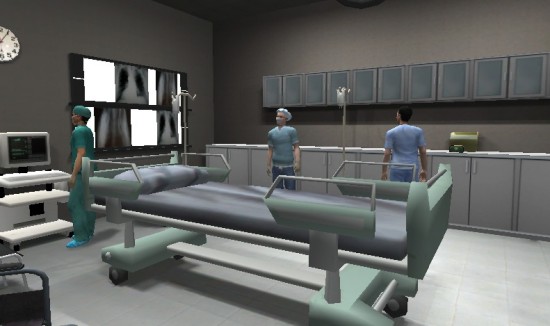Healthcare and the pharmaceutical industries can benefit from using training simulations and serious games in everything from sales and customer relations to helping medical professionals work with upset patients.
Since replicating these types of experiences in traditional training programs is difficult and costly, finding a much more effective, learner centered way to develop skills, knowledge and understanding of medical procedures and methods makes practical sense.
Simulations in the healthcare industry
Nurses in particular are often the medical professionals that have to deal with a huge variety of requests, demands, questions and problems. Being able to provide training for each and every possible scenario they may face in a week or even a day is far too costly and a scheduling nightmare.
A far better option is to have a variety of real time 3D modules or training scenarios online, all accessible at any time. In just a few minutes the nurse or medical professional can choose a scenario, review the objects and play through the learning experience.

These learning experiences can coordinate with any aspect of the nurse’s professional requirements or the demands of patients and their family members. By practicing specific scenarios through serious games, the nurse becomes comfortable with a response that is going to achieve the desired results.
The nurse or medical professional can also use the prompts, cues and guides provided by the game to learn why one response or choice is more appropriate than another in any of the modules or simulations. Practical training in how medications may cause side effects, how billing questions can be answered, and even how to follow specific procedures within the emergency room, are all excellent options for using serious games in the healthcare industry.
Pharmacists can use training modules to learn how to spot altered or fraudulent prescriptions, how to correctly interact with customers to provide drug information and how to manage pharmacy records. These topics can all be incorporated into online training simulations.
Since these are potentially problematic areas if incorrectly handled, the practice and review offered in interactive training simulations builds up professional confidence and understanding of both legal and ethic issues that may arise.
Simulations in the pharmaceutical industry
What sales rep or pharmaceutical company staff wouldn’t like to have the answers to any questions about their products that a doctor may pose? In addition what rep doesn’t want to have the best possible approach to marketing and selling the medications or medical suppliers they represent?
Training simulations can be used to help new or experienced reps in understanding the best possible sales techniques for any given product. The ability to try out different ways to provide product information, answer questions posed by the 3D doctor in the simulation and to describe the uses and benefits of different new drugs are all possible with online simulations.
In addition, by structuring the serious games so that they are provided on the Internet the data or scores by each rep can be logged by the training director’s LMS or Learning Management System. This data can be used to evaluate employee professional development, to help in areas of weakness in real world performance and to track successful completion of the various modules and simulations for the drugs and medical supplies marketed. As with medical professionals, ethical simulations can also allow managers and trainers to have greater confidence in how their employees respond in any given situation, without any risk to the company in a real world scenario.
(This column is reprinted with permission from 3D Serious Games and Simulations.)
- Understanding the oxymoron of serious games - February 6, 2013
- Virtual campus tours: 4 wrong turns - April 13, 2012
- Medical simulations can benefit healthcare, pharma industries - September 8, 2011
